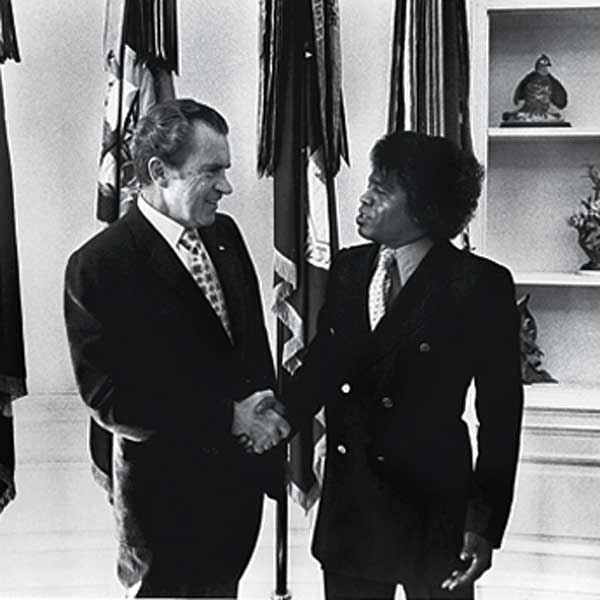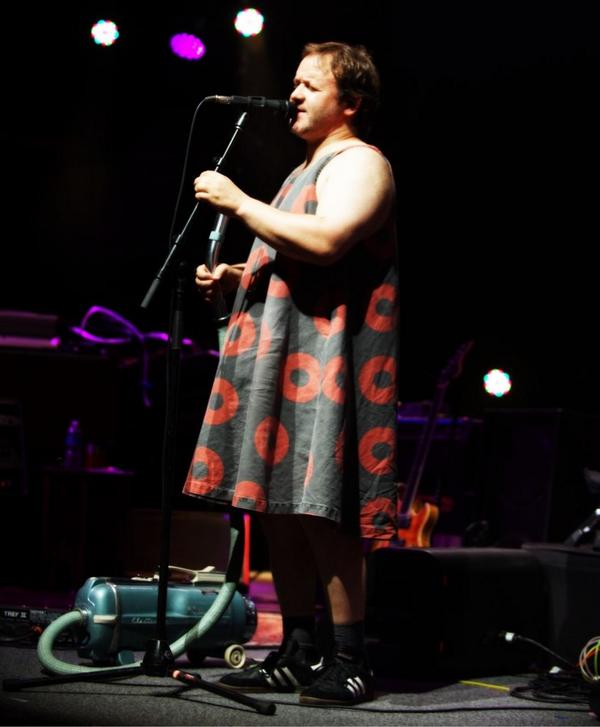BLOG POSTS WHERE MONTH IS 7, AND DAY IS 28, AND YEAR IS 2014
MYSTERY JAM MONDAY PART 181
Ah, yet another Monday. Yet another workweek to plow ourselves through. Yet another stellar Sunday Phish show's afterglow in which to bask. And yet another Mystery Jam to solve!
Yet another winner will receive an MP3 download courtesy of our friends at LivePhish.com / Nugs.Net. To win, be the first person to identify the song and date of the mystery jam clip. Each person gets one guess per day, with the second “day” starting after I post the hint. A hint will be posted on Tuesday if necessary, with the answer to follow on Wednesday. Yet another chance for me to wish you all good luck!
Answer: This week's clip was taken from the 12/5/99 Meatstick, which @PersnicketyJim identified to win the MP3 DL and pick up his fourth MJM victory, all impressively occurring in the last thirteen contests. Additional kudos to @ucpete for his reverse-engineering efforts, noting that the 12/5/99 Rochester show featured the debut of Sunday's noteworthy bustout, Jennifer Dances. For his efforts, he wins unlimited access to the LivePhish.com MP3 preview clip of his choice. Check in next Monday for MJM #182.
MPP2 RECAP: THIS IS IT
Preamble
When, in the course of human events, your favorite band plays a show that is just stupid-good—and historically important, in the context of an already rich and well-documented history—and, by chance, you have volunteered in advance to write a recap of that show for Phish.net…well, sometimes the best thing you can do is just shut up about it.
But, let's face it, that's not really my thing.
We deliberately call these items “recaps” rather than “reviews” because they are envisioned as timely, just-the-facts accounts of the show, with some amount of on-the-fly analysis mixed in. By design, they violate the “72 hour rule,” invoked by some fans (once upon a time) as a necessary buffer period to digest a show and let its immediate afterglow wear off before issuing any declarations about its greatness.
Yet, how does a just-the-facts summary of Sunday night’s show at Merriweather Post Pavilion, skipping chronologically through the setlist with nods for a tight “The Curtain With” here and a sarcastic comment about “I Saw It Again” there, capture the spirit of what happened? The absurdity of such an approach can be glimpsed in our (reasonable and accurate) setlist: “The third Tweezer included Page teasing Manteca.”
The third Tweezer, mind you.
Would invocations of the Tweezerfests from 1994 add historical context that enriches our appreciation of 7/27/14? Well, yeah, sure. But in the immediate aftermath, all I want to do it listen to it again. Or re-read the live-scroll of my group of JadedVet friends and .net colleagues, some at the show but most (like me) listening or watching from home, reacting in real time to the insanity and flipping out.

Yet I know part of the experience of savoring and enjoying a show, for people like us that come online to read and talk about this band, is indeed to read and talk about it.
But first, let’s take another moment to let it settle in—a show that goes beyond the level of "great" and gets short-listed when people talk about why they like Phish in the first place. And consider this prelude a sort of Havdalah service at the end of Shabbat, formally separating the sacred (if you will) music from the profane discussion of it. (Not to get all William-Blake-of-recaps on you.)
Take a breath. Let the afterglow solidify into a patina of glazed satisfaction.
I’ve been waiting ten years to say this: Phish is back.
The End of Phish History
In his 1992 book The End Of History and the Last Man, political theorist Francis Fukuyama argued that after the Cold War, Western-style capitalism and democracy had finally emerged as the final stage of political-cultural evolution, signaling the end of the churning series of cultural systems and political ideologies that had been conflicting and clanging against each other since the dawn of human civilization. (I’m no expert, but that’s more or less the gist.)
Since they returned from the Breakup, I had come to feel a similar way about Phish. The initial excitement that accompanied the Return turned, sometime in 2009, into a smile frozen on my face as I nervously looked around the room and waited for things to really get going. That summer of 2009, recall, there was lots of talk about waiting for “3.1” to emerge—the idea was that Phish was still finding its way back, and on some night soon there’d be a moment where they would finally break through again, and return grandly to the improvisational interplay and all-around chutzpah they enjoyed before exiting Coventry in four separate tour busses.
(For all that was troubled in the 2.0 era, Phish returned from the 2000-2002 hiatus at the very top of its improvisational game, and even through the emotionally turbulent August 2004 shows was churning out peak jams, from the SPAC “Piper” of 6/19/04 to the less-remembered but similarly incredibly “Birds of A Feather” from 8/10/04. That’s what made the hastily-announced breakup seem so cruel and bizarre, before it emerged that personal problems—and not the non-existent creative problems cited in Trey’s infamous “we’re done” letter—were the actual cause of the split. And once Trey was frank about that, how could any of us complain that he did what he needed to do to get healthy? But it took years for that to become clear.)
For me and lots of like-minded fans, the sense of linear progress that had marked Phish’s evolution forever (at least through Big Cypress—a feeling Fishman later summed up as “rolling a boulder up a hill”—and then again from the end of the Hiatus through to the ashes of Vegas ’04) was over. In 3.0, it was all a sort of equivalent mush—occasionally there’d be a “Seven BeGhost” or a Pine Knob “Disease,” but shows would always level off again into a place of improvisational hesitancy and ripcords. Phish didn’t seem to be building toward anything anymore. There was not the sense that IT was happening, or that IT could happen at any moment. We were Glad They Were Back™ and went for the experience, to see our friends converge within the show-going ritual, and perhaps to get lucky and catch an “Icculus” or a highlight jam. But the sense that each tour was building upon the previous one to sketch out an ever-dynamic history was sadly missing, for many of us.
Meanwhile, there’s been a weird bifurcation in Phish-appreciation out in the fan community. While the above description is more or less a mainstream summary of what many long-time fans consider to be the “true” story of 3.0, there are many readers who right now are wondering what the fuck I’m talking about.
It’s completely natural that, after a 4-plus years break, a whole new generation of fans has been in its first flush of newbie star-gazing, where everything sounds great and the band can do no wrong. But, although Phish’s biggest fans have been gathering online to parse the band’s musical development and apply the very high standards Phish had earned for itself—all from a place of great dedication to and love for the music—since the early 1990’s, a culture emerged during 3.0 where this was suddenly sacrilegious.
Even though these are the very fans who traded tapes by mail and created the internet network that facilitated Phish’s remarkable, grassroots growth, newcomers had burst into the room and boorishly insisted that “real” fans would never presume to analyze a Phish show objectively, comparing and contrasting what happened last night with what they’d done before.
No, the new orthodoxy was to enforce this End of Phish History at the point of a rhetorical sword: We should all just be glad they’re back, dude. Stop going to shows if you’re going to complain. It’s all good. If you insist on seeing lows that color and give heft to the highs, rather than a flat landscape of identical brilliance, then you just don’t get it. Mini-cults emerged online around newly vocal fans who suddenly emerged and delivered what plenty of new fans wanted to hear: validation that they were present for the glory days of Phish. All evidence to the contrary notwithstanding.
What this rigid line of thought failed to understand was that we were never trying to deny that anyone had had a good time at the show, or that their experience was meaningful and special and worthwhile and Phishy. Or that Phish remained a special band in the musical universe and that we felt lucky to, yes, Still Be Seeing Them At All. All those things remained true. We were just hearing the music in context. Like we’d always done.
And surely, we missed some things that newer, fresher fans could pick up and rightfully enjoy. And in a way, that was our own fault. But JadedVet bitching is really, at bottom, a form of gallows humor. There was never a moment when any of us wouldn’t have rather declared that All Is Well, again. So in the end, who is to say which is the privileged position? Many would surely trade their enhanced appreciation of an atypical "Tweezer" for the jump-up-and-down-joy at your first "Golgi."
While I've been using the royal-jaded "we," this is a good place to note that this recap is expressing my own personal views. It hasn't been approved by any Politburo. Your mileage may vary, or overlap.
(Digression: Me and Richard Nixon
So who am I, by the way? After seeing my peers get into Phish for several years, I finally discovered the band in 1995 and became instantly obsessed. I spent many hours on the old rec.music.phish. I read every single one of Charlie Dirksen's Tweezerfiles and reviews of Mike's Groove. I contributed lots of content to The Phish Companion and have been on the board of The Mockingbird Foundation since 2000. I've made my evolving relationship with Phish a public thing.
I got jaded, became born again, had a peak life experience at Big Cypress, rode out the Hiatus, was there for the first Return, witnessed the band at a high point in its history at IT, mourned the Breakup, and more or less moved on.
During 3.0 I've been revaluating my relationship to the music and the scene, prompted most, I argue, by what was happening onstage. And though I was very enthusiastic about fall 2013, I was profoundly disillusioned by the "Wingsuit" set at Halloween, and entered probably my lowest point as a Phish fan. I made some very bitter dismissals of that set. I skipped the New Year's Run. I just needed distance. My rage stick seemed broken.

Richard Nixon earned his political stripes and public credibility as an anti-Communist crusader. So it was against type when he ventured to China and started the process of normalizing relations between the U.S. and that country. Thus the expression: only Nixon could go to China.
Although I've come over the years to r.m.p, or the Phish.net blog, or another print or online venue, to declare renewed excitement about what Phish was doing at the time, each time I've found my own way there. Each time it's been an organic process and a pleasant surprise for me. Now I rarely take to the "airwaves" to spout off about Phish. I leave that to people who are more into it, and more qualified to talk about the latest developments. And frankly, I find my long digital trail of pronouncements more than mildly embarassing, as I'm not sure if my current aesthetic (and professional skills/instincts) can really stand behind all of those passionate prouncements from years gone by.
So when I declare my excitement today about what Phish is doing now, it's no knee-jerk thing. It's no play to the masses. But if 3.0 has become a Chinese buffet of renewed artistic relevance, I am shoving my face right into the General Gao's chicken.)
Umm, yeah, no.
Something funny happened on the way toward Phish’s sad post-history as a nostalgia act. It took more than three years, but Phish got its swagger back. After experimenting with bust-outs and mash-ups to gin up fan enthusiasm in the absence of boundary-breaking improvisational fireworks (or new material) in the previous years, summer 2012 offered more than a tease that things were changing. Then, the Dick’s 2012 shows happened—particularly the first night. In its mold-breaking series of surprising improvisations, spread through an entire show (including the first set), including songs like “Runaway Jim” that seemed like they may never jam again—it felt, in many ways, like the first Phish show since 2004.
Then summer 2013 gave its richest gift, the Tahoe “Tweezer,” a jam that for once could be described with all sorts of superlatives without the caveat “for 3.0.” It reached peaks that were higher than a kitty riding a giraffe. And fall tour was a nightly march toward renewed relevance. The great jams were no longer red herrings. They built upon each other, creating a new level of achievement and creating the sense that there was still a future left to invent.
So, then, summer 2014. The present tour. The one-step-up, two-steps-back phenomenon that characterized 2009-2011 could finally be seen to be over. It’s not just that the jams are better and more frequent, which they are. But that 3.0 tentativeness is gone. There are certainly some inner formulas the band continues to work with, but for the first time in a long time there’s the sense that something like “The Wedge” might suddenly emerge as a major jam, that a piece of improvisation will grow and change direction (even after the first little lull where a few years ago Trey would abruptly jump into “Julius”), that a second set will keep fighting and gain momentum even after the first “cooldown” song or two suggests that things might be winding down for the night. There’s the sense that each night onstage is another chapter in an evolving history. That the music will boldly venture to bed, bath and beyond.
By this point, it’s already been two years of the good stuff—this transcends the level of “exciting promise” and amounts to its own successful mini-era in and of itself. There’s no fear of the rug being pulled out, because the foundation is already there, at a higher level. The sense of the term “3.0” as not only a chronological marker but a rough stylistic grouping is over. This is not your older sister’s 3.0. It’s a new time.

Photo © Phish – Phish From the Road
Get Back On The Tweezerfest
One emerging trend of the summer tour has been the band’s newfound proclivity for the lost art of segues. Some shows have been held up by obvious, standout jams—the SPAC “Fuego,” the Randall’s “Chalkdust,” etc—others have dipped in and out of exciting jams while nimbly transitioning from song to song. This seemed to have reached its peak with Saturday night’s show, with fare like an out-of-nowhere, Page-led artisanal segue from “Light” into “2001” that provided its own thrill in place of an extended “Light” jam. It’s not a ripcord when it’s an inspired, full-band transition.
So, then comes Sunday night’s show. It’s always good when the boys take the stage looking to disprove the theories of Francis Fukuyama.
Several people have already shouted in my ear that Sunday’s first set is the best first set of the tour. Personally I’m a Big Jam Hunter, so I’d rather get one Randall’s “Gin,” or even the SPAC “Reba” + “SOAM”. But many insist that the first set of 7/27/14 was deep and consistently pleasing in a way that first sets rarely are these days. Though there are no jams of note, as is customary these days, I agree there’s little better summer entertainment than a nice, pre-dusk “The Curtain With.” And a first-set “Sand” is not just a “Sand.” (Is anything?) The set also saw the best two tracks from “Fuego”—the title track, stashed considerately in the first set so as not to arouse false hopes of another Type II breakthrough version, and Mike’s lovely “555.” (Given that Mike introduced Americana to the Phish sound, it’s interesting that his latest output sounds almost like he’s never even heard the work of Mumford and Sons.)
All-around, the first set left people feeling very upbeat about the show. But we know that shows are won and lost in the second set. And after a snappy “Wilson” opener, it was only the third quarter but Phish sensed that it was already winning time.
Some interesting Fishman rhythms in the very infancy of the “Tweezer” jam gave way to what appeared to be a tease of “Get Back On The Train.” But Trey jumped on board right away, guiding a full transition into the song. Fess up, some were grumbling at how the “Tweezer” jam was aborted so quickly. But no, they rode the train for only a verse before zooming back into “Tweezer.” Yes!
The jam that leaves one song, goes to another, and returns to the original song is a particularly prized thing among Phish fandom. It’s special—though fairly frequent in some periods (like Summer 1993), it isn’t even an annual occurrence now. But not only seguing into and out of, but lacing an entire set with Tweezer is the sort of thing that’s referred to in tones of hushed reverence among Phish fans. That’s what they used to do, in 1994, when the magnificence of Phish’s capacity for deep improvisation and inspired, thematic jamming was emerging in full flower. It’s the basis of legendary shows like the Bomb Factory and Big Birch. It’s hardcore, old school, highly accomplished Phish straight to the dome. It’s what happened last night at Merrimeather.
There’s no need for me to narrate the twists and turns of last night’s second set here. And you’re not here to have that briskly outlined, are you? You’re here to share in the sense that something really special happened. And engage in some verbal high-fiving and patriotic fist-bumping. Me too. (In fact, that's have a quick round of 'em. OK.)
Yes, there was some good jamming in the actual “Tweezer,” particularly before the segue into “Waiting All Night” seemed (falsely) to indicate the end of it. But to me, the most important thing about last night is that even in the midst of “Free,” a song that many fans have long dismissed as a source of anything new and interesting, I for one was still perfectly upbeat as I waited to hear what would happen next in this engaging set. Did I think they’d go back into “Tweezer”? No. But when they did, briefly, and then segued right into “Simple,” it felt perfectly natural. It was mold-busting and original and thrilling and simultaneously not at all out of character. It was what Phish does now. Again.
And when “NICU”—a song that to my knowledge had only jammed out once before, in the legendary 12/14/95 show that also featured a multi-headed “Tweezer”—exploded out of nowhere into the highlight jam of the night, it was surely cause to jump up and down and “woo!” at the moon. But it wasn’t a shock. It was Phish, circa summer 2014. Think about it.
So when Fishman took center stage for a “Henrietta” song for the first time since 7/6/12, and launched (apparently spontaneously) into a hilariously mocking rendition of perhaps Phish’s most-mocked (and rarely seen) original, “Jennifer Dances,” it was organically generated humor that sprung from the band/audience relationship. It wasn’t forced. It was loose and optimistic and confident and swinging.

Photo © Phish – Phish From the Road
We’ll spend plenty of time figuring out where to rank 7/27/14, and how to measure its spontaneity and incredible flow versus the more heavy-duty jams found in some other recent places. There’s time for that. We’ll also talk about how a show like last night ranks as great by any Phish standard, including the days of 1994 when Tweezerfests were the hot new item.
But for now, I think it’s enough to exult in the fact that such great stuff is happening on a near-nightly basis. To realize that Fall 2013 and now Summer 2014 are great full-tours, not only “for 3.0” but for Phish. It’s enough just to feel like anything might happen on a given night. Most of all, it’s enough to know that Phish is making its own history. Again.
PHISHLOSOPHY @ PHISH.NET
This week, Phish.net will host several events in conjunction with, and as part of, PHL360: Philosophy and the Arts at Oregon State University. The course is taught by Assistant Professor of Philosophy and "huge Phish fan" Dr. Stephanie Jenkins, who has nicknamed the course "Philosophy School of Phish." (See promo video and syllabus.)
Through midnight tonight, enrolled students will be submitting questions to be answered in a Wednesday morning blog post by Ellis Godard (aka "Ellis of Lemuria") - an Associate Professor of Sociology and Executive Director of the Mockingbird Foundation, who has been involved with Phish.net since 1991 (and who earned a minor in Philosophy, though perhaps too long ago to be helpful.)
Throughout the day on Wednesday, Drs. Godard and Jenkins will lead discussions about these and other questions in a forum thread (possibly two; they'll be sticky'd at the top). We welcome the involvement of enrolled students in what we hope they will find to be a vibrant and inviting community. And we hope our forum regulars are ready to step up their rhetorical game and hone their linguistic chops for some serious scholarship about the band, their music, and we fans.
Finally, on Wednesday evening, Dr. Godard will host a Google Hangout session for student, to wrap-up discussion, answer additional questions, and reflect on Phish.net and students' experiences here.
The class' topic for the week is "Community". Readings include two chapters of Jeanette Bicknell's Why Music Moves Us, as well as "The Everyday Miracle of the Occasional Community" by John Drabinski, part of Steve Gimbel's The Grateful Dead and Philosophy: Getting High Minded about Love and Haight. Bicknell's book ships from the UK and will take weeks, but Drabinki's chapter is online.



 The Mockingbird Foundation
The Mockingbird Foundation